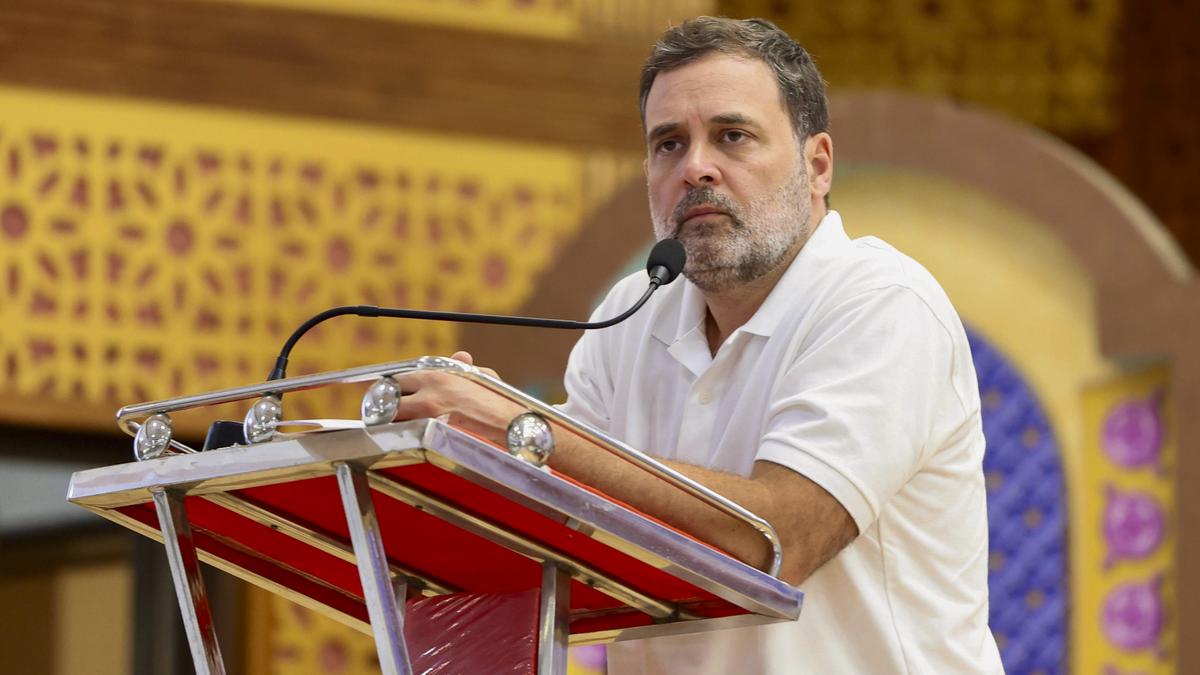Rahul Gandhi: Truth Protects Me, Inherited From Nehru
National NationalPosted by AI on 2025-04-19 23:06:53 | Last Updated by AI on 2025-08-02 05:04:58
Share: Facebook | Twitter | Whatsapp | Linkedin Visits: 4

"Truth and courage." These are the pillars upon which Rahul Gandhi, prominent leader of the Indian National Congress, says he stands. In a recent dialogue with fellow party member Sandeep Dikshit, Gandhi asserted his right to speak freely, claiming this inherited legacy shields him. The conversation, which touched upon various political themes, provided a glimpse into Gandhi's perspective on his political lineage and approach. He explicitly linked his outspokenness to the values instilled in him by his great-grandfather, Jawaharlal Nehru, India's first Prime Minister.
The discussion between Gandhi and Dikshit unfolded against a backdrop of ongoing political discourse in India. While the exact details of the broader conversation remain undisclosed, Gandhi's statement about truth and courage serving as his protection became a focal point. It raises questions about the nature of political discourse, the boundaries of free speech, and the role of legacy in shaping political ideologies. Gandhi's invocation of Nehru's legacy adds another layer of complexity. Nehru, a towering figure in Indian history, remains a subject of both admiration and criticism, with his policies and decisions continuing to be debated decades later. By associating himself so closely with Nehru's principles, Gandhi seemingly seeks to position himself within a particular historical narrative and political tradition. This strategic move aims to resonate with a segment of the Indian populace that still holds Nehru in high regard.
Gandhi's assertion that truth protects him also hints at the increasing polarization of political discourse. In an era of rapid information dissemination and often heated online debates, the concept of "truth" itself has become contested. Differing interpretations, selective presentation of facts, and the proliferation of misinformation contribute to a climate where claims of truth are often met with skepticism. Gandhi's statement, therefore, can be interpreted as both a defense of his own pronouncements and a commentary on the challenging landscape of contemporary political communication. He suggests that adhering to a principled stance, rooted in truth and courage, is its own form of protection against criticism or backlash.
This conversation between Gandhi and Dikshit offers a valuable window into the ongoing evolution of political dialogue within India. It underscores the enduring relevance of historical figures like Nehru in shaping contemporary political thought and highlights the complex interplay of legacy, free speech, and the pursuit of truth in the modern political arena. It remains to be seen how Gandhi's invocation of his great-grandfather's legacy and his emphasis on "truth as protection" will resonate with the Indian public and influence the broader political discourse in the country.
Search
Categories
- Sports
- Business
- History
- Politics
- International
- Science & Technology
- Social Issues
- Disaster Management
- Current Affairs
- Education
- Startup Business
- Startup News
- Awards
- Community Services
- Fundraising Events
- Volunteer Services
- Health Initiatives
- Innovations and Initiatives
- In News
- dummybanners
- Awards
- Partners
- Products
- Press Releases
- News
- Fast Check
- South
- సినిమా
- Gallery
- Sunday Chronicle
- Hyderabad Chronicle
- లైఫ్ స్టైల్
- National
- క్రైం
- ట్రెండింగ్
- జాబ్స్
- అంతర్జాతీయo
- బిజినెస్
- రాజకీయం
- బిజినెస్
- సంపాదకీయం
- నవ్య
- చిత్ర జ్యోతి
- క్రీడలు
- జాతీయం
- తెలంగాణ
- తాజా వార్తలు
- మన పార్టీ
- మన నాయకత్వం
- మన విజయాలు
- డౌన్లోడ్స్
- మీడియా వనరులు
- కార్యకర్తలు
- North East Skill Center News
- Government Schemes
- Entrepreneurship Support
- Employment Opportunities
- Skill Training Programs
- Departments
- Investments
- Initiatives
- Resources
- Telangana IT Parks
- Events & Jobs
- Press Releases
- News
- Airport News
- Newtons Laws of Motion
- Karbonn in Business
- Investments in Karbonn
- Company quarterly sales
- Markets
- Auto News
- Industry
- Money
- Advertisements
- Stock target
- Company Updates
- Stock Market
- Company Sales
- Staffing and HR
- Constituency Assembly
- General News
- Srikalahasti Temple
- Bojjala Sudhir Reddy
- Technology & Innovation
- Sports
- Business
- Products
- Industries
- Services & Trainings
- Tools & Resources
- Technology Integration
- Drug Seizures & Arrests
- Telangana Narcotics
- Law & Enforcement
- Rehabilitation
- Nationwide Drug Policing
- Nigeria Seizures
- Global Operations
- Drug Awareness
- Drug Enforcement Tech
- NCB Drug Seizures
- Judicial Crackdown
- India's Surveillance Tools
- Cross-Border Links
- Women Safety
- Cyber Crimes
- Drug Abuse
- Traffic & Road Safety
- Community Connect
- Public Safety Alerts
- Citizen Assistance
- Nellore City News
- Politics & Administration
- Events & Festivals
- Agriculture & Rural
- Business & Economy
- Health & Wellness
Recent News
- Oppo's Innovative Cooling Technology Coming to India with K13 Turbo Series
- Pakistan, Afghanistan & UAE To Play T20I Tri-Series In Sharjah Prior To Asia Cup
- India Vs England 5th Test Day 2 Weather Forecast: Will Rain Delay The Match?
- Surprise Choice! Shardul Thakur Appointed New West Zone Captain
- Boxing Federation Of India Elections Set For August 21
- 'Force Majeure Pause': Odisha FC Suspend Players, Staff Contracts Amid ISL 2025/26 Limbo
- Manchester United Make Enquiry For Manchester City Goalkeeper Stefan Ortega
- Prajwal Revanna's Leaked Videos: Rape Case and 2,000 Obscene Clips